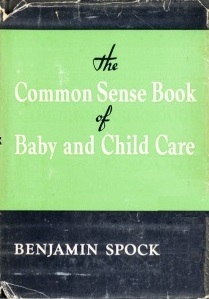The Common Sense Book of Baby and Child Care

First edition
|
|
| Author | Benjamin Spock |
|---|---|
| Country | USA |
| Language | English |
| Subject | Child care |
| Publisher | Duell, Sloan and Pearce (New York City) |
|
Publication date
|
July 14, 1946 |
| Pages | 527 (1st edition) |
| OCLC | 654127882 |
The Common Sense Book of Baby and Child Care written by Benjamin Spock, is a manual on infant and child care first published in 1946. The book, along with Dr. Spock, attained fame almost instantly, selling 500,000 copies in its first six months. By Spock’s death in 1998, over 50 million copies of the book had been sold, making it the best-selling book of the twentieth century in America, aside from the Bible. As of 2011, the book had been translated into 39 languages.
Spock and his manual helped revolutionize child-rearing methods for the post-World War II generation. Mothers heavily relied on Spock’s advice and appreciated his friendly, reassuring tone. Spock emphasizes in his book that, above all, parents should have confidence in their abilities and trust their instincts. The famous first line of the book reads, “Trust yourself. You know more than you think you do.”
Spock’s book helped revolutionize child care in the 1940s and 1950s. Prior to this, rigid schedules permeated pediatric care. Influential authors like behavioral psychiatrist John B. Watson, who wrote Psychological Care of Infant and Child in 1928, and pediatrician Luther Emmett Holt, who wrote The Care and Feeding of Children: A Catechism for the Use of Mothers and Children's Nurses in 1894, told parents to feed babies on strict schedules and start toilet training at an early, specific age. Watson, Holt, and other child care experts obsessed over rigidity because they believed that irregularities in feeding and bowel movements were causing the widespread diarrheal diseases seen among babies in the late nineteenth and early twentieth centuries.
Furthermore, these experts, whose ideas were embodied in Infant Care pamphlets distributed by the U.S. government, warned against “excessive” affection by parents for their children. To maintain sterility and to prevent children from becoming spoiled or fussy, these experts recommended kissing children only on the forehead and limiting hugs or other displays of affection.
As a practicing pediatrician in the 1930s, Spock noticed that prevailing methods in pediatric care seemed cruel and ignored the emotional needs of the child. He wanted to explore the psychological reasons behind common problems seen during practices like breastfeeding and toilet training, in order to give less arbitrary advice to mothers who came to his practice. He thus became trained in psychoanalysis, emerging as the first pediatrician with a psychoanalytic background. Seeking useful ways to implement Freudian philosophy into child-rearing practices, Spock would try out his advice on patients and their mothers, continuously seeking their response. He contradicted contemporary norms in child care by supporting flexibility instead of rigidity and encouraging parents to show affection for their children.
...
Wikipedia
